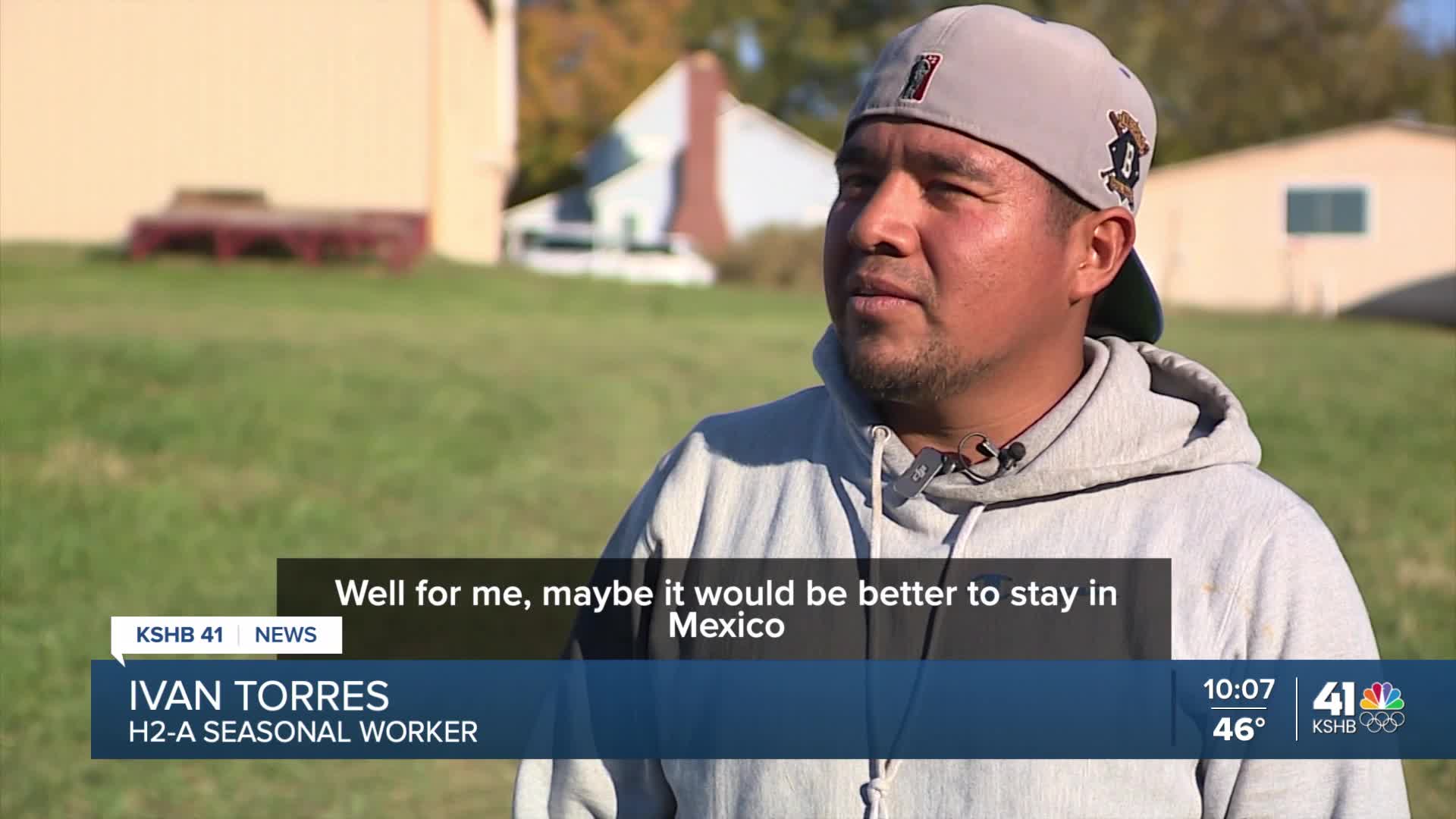KSHB 41 reporter Ryan Gamboa covers Miami County in Kansas and Cass County in Missouri. He also covers agricultural topics. Ryan has followed this story since the beginning of the year. Share your story idea with Ryan.
—
There's a lot of work still left to do at Bowlin Farms as the season comes to an end. Victor Hernandez and Ivan Torres head back home to Guerrero, Mexico, on Sunday.
RELATED | U.S. agriculture reliant on migrant labor, Kansas farmers cite lack of local labor
"I’ve had dreams of having my own house, of my parents having a better house, of them having better opportunities," Torres shared. "I’m also preparing myself to build a better future — so that when I get married, I can have my own home and a safe place for myself and my things."
The two men saw the land of opportunity as their path to a fulfilling life. They are visa farm workers, participants in the H2-A Seasonal Worker program.
"I come here for new opportunities, for a better future, because in Mexico it’s a little complicated," explained Hernandez.
Ivan and Victor spoke to KSHB 41 in their native language. The interviews were translated.

KSHB 41 has covered concerns about the affordability of the H2-A program over the past year.
RELATED | 'We come for work': USDA rolls back migrant seasonal worker requirements for farmers
The program has grown in popularity across the United States as domestic farm labor becomes sparse, labor data suggests.
Bowlin Farms owner and operator Steve Bowlin brought forth concerns ahead of the new Administration and changes in immigration policy. Since January, Bowlin has expressed that the requirements to utilize the program could become too expensive.
"I spent about $100,000," Bowlin said last month.

That total encompasses legal fees, plane tickets, housing, and required wage rates.
One nuance of the H2-A Seasonal Worker program is that Bowlin is required to pay a certain wage and provide housing for his employees.
2025 wages amounted to over $19.00 per hour for both Ivan and Victor.
"To do what we do here, to produce the food we produce, we would not be able to do it without them," he said.

In late September, United States Department of Agriculture Secretary Brooke Rollins paid a visit to Kansas City. During her trip, she announced some key priorities her administration is working on, one of which included restructuring the H2-A Seasonal Worker program, eliminating the Adverse Effect Wage Rate (AERW), the scale determining pay, eliminating in-person interviews for visa renewal, and allotting a percentage of wages to housing.
"We got some great change and some not so great change," Bowlin said, acknowledging he was asking for program reform. "It's gone too far."
Now is the time, Bowlin and the guys start planning for next year.
According to an early October American Farm Bureau report, the new minimum wage rates show a 36% cut to Ivan and Victor's pay. That would mean around a $7 decrease.

"They're worth more than $12.62 an hour," added Bowlin.
Hovering around the $12.62 mark, subtract about another $1.30. Ivan and Victor's hourly wage drops below $12 — that dollar is what would be deducted for housing.
"Everything is changing right now," Torres said.
Farm labor is expected to cost farmers $54 billion this year, Secretary Rollins said during a Kansas City speech in September.
Bowlin has consistently expressed that he has difficulty finding domestic workers who can produce the way the H2-A workers can.

"With H2-A, you’re getting the bang for your buck, you’re getting the labor, but you’re getting efficient labor," Bowlin said.
Over the past month, Bowlin, Ivan, and Victor have had some difficult conversations about what next year looks like.
If Bowlin were to cut his workers' pay down 36%, the two say they would not return next year. Instead, they have agreed on a wage hovering around $18 an hour and Bowlin says he will adjust how he houses the two.
"It’s a bit complicated. We understand his concern — he also needs to make his money, just as we make ours," Hernandez said. "We come here, leaving our families, our friends, our moms and dads behind. It’s a big sacrifice to come here and be far away. And now that things are changing — like the pay and all that — it’s a bit hard. But we also understand that he needs to be better off financially to keep supporting us."

Both Ivan and Victor showed immense gratitude for what the Bowlin family has provided them. When KSHB 41 was leaving the farm on Thursday night, Steve's 88-year-old mother was preparing dinner for the boys, a weekly tradition.
"These guys have become more like family. It's been a long month of having some sad conversations. I am glad that we can make it work to have them back," Bowlin expressed. "I think they need to take at what the people bring to the program, and value it accordingly. Not just a blanket, 'Oh, they're farm workers, so you're level 1.'"
"Without those two, I can’t do it," He added.

The clock is ticking as Ivan and Victor set to head home in a couple of days. The three will spend their final days of the 2025 season and pray for one more or a shortened year.
"I’ve really gotten used to this place, because I’ve thought it could be a good future for my family here. Sometimes I’ve thought that I could build a family here — maybe bring my girlfriend, marry her, live here, have kids, and build a future in this area," Torres said. "It might be about the salary, but they really treat us very well here. It can’t be that part, because I can’t complain — they treat us too well here."
—





